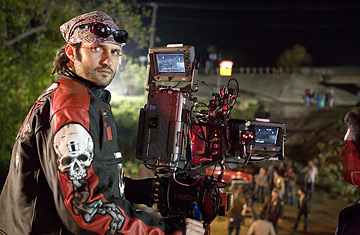
Director Robert Rodriguez, on the set of Grindhouse.
(2 of 2)
With the legislature meeting only for a few months every two years, passing an incentive package this spring was considered vital. But supporters didn't take into account the lingering resentment of the movie Glory Road, the inspirational tale of the Texas Western Miners, the first all-black college basketball team to win a national championship. In one of the movie's game scenes, the Miners played East Texas University, now Texas A&M-Commerce, and Aggies were enraged at their depiction as racist. While the Miners were derided and experienced racism during their rise to glory, the depiction of Aggie fans as racist was historically inaccurate, critics said; Hudgins said the movie used poetic license in the scene to symbolize several real incidents. With Aggie sensibilities so offended, state senate finance committee chairman Steve Ogden, a Republican whose district includes Texas A&M University, plugged in the conditions clause and no amount of lobbying by a mobilized Texas film industry could dislodge it.
"I wasn't happy with the language, but overall I don't think its going to be a problem," said Dallas producer and filmmaker Todd Sims. The director of the award-winning 2005 independent movie Echoes of Innocence, Sims said any measure of control over content can be a slippery slope, but passage of an incentive bill was critical to the Texas film industry. "No one is saying you can't shoot a movie in Texas that makes Texas look bad. All we are saying is you are not going to get a grant," Sims said. And regardless of content, all filmmakers will be able to avail themselves of the state's generous sales tax exemption on production costs.
The funding bill backers also included some of the most influential leaders of the computer game industry, including the legendary Richard Garriott, known by game fans as "Lord British," who now heads Korean giant NCsoft's Austin design company. NCsoft is just one of the 80 game developers in Texas, which is the third biggest game development center in the country, behind only California and Washington. "There is an intersection between the film industry and the game industry. Especially in animation there is a huge crossover in the workforce," said Katy Daiger, the film commission's liaison to the game design industry. In terms of economic development, Garriott said, the game design industry has a greater impact than film and it boasts a workforce that any city would want to attract — permanent, creative, well-educated and high earning.
But for some conservative politicians the game design industry has been all about violence and headlines, which is why the funding restrictions ultimately included it as well as the film business. "I actually tend to agree, in general," Garriott said. "The state does not need to be supporting pornography. If it clearly besmirched the state, the public would be outraged that it was funded with Texas dollars." What is more important to Garriott is the acknowledgment of the growing importance of his industry, even if a $250,000 grant won't pay for too much in a business where a new game can cost more than $10 million to develop.
Not all filmmakers, however, are so understanding, and the MPAA believes the film incentives will ultimately end up in court. While the MPAA is not planning a lawsuit, in its letter to Gov. Perry the industry group cited a long list of appellate cases supporting their position. David Kendall, the noted First Amendment attorney with the Washington-based firm Williams and Connolly, said the Texas law is not only vague, but may run afoul of First Amendment protections. "I think if the state benefit is conditional or can be revoked, it is plainly unconstitutional since the First Amendment prevents content discrimination," Kendall said, adding puckishly: "The reputation of Texans does not need legal protection beyond the state."
